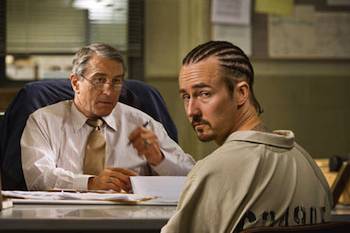- MENU
- HOME
- SEARCH
- WORLD
- MAIN
- AFRICA
- ASIA
- BALKANS
- EUROPE
- LATIN AMERICA
- MIDDLE EAST
- United Kingdom
- United States
- Argentina
- Australia
- Austria
- Benelux
- Brazil
- Canada
- China
- France
- Germany
- Greece
- Hungary
- India
- Indonesia
- Ireland
- Israel
- Italy
- Japan
- Korea
- Mexico
- New Zealand
- Pakistan
- Philippines
- Poland
- Russia
- South Africa
- Spain
- Taiwan
- Turkey
- USA
- BUSINESS
- WEALTH
- STOCKS
- TECH
- HEALTH
- LIFESTYLE
- ENTERTAINMENT
- SPORTS
- RSS
- iHaveNet.com: Movie Reviews

A stern four-character chamber piece, "Stone" begins with the line, "You keep my soul in a dungeon," and follows it up immediately with "I'm leaving." This is not a movie afraid of stating its business and hitting the nail on the head. Yet it is about people who do not leave, at least upfront; it is about being stuck, but nearing a boiling point.
Genuinely odd in its mixture of bluntness and indirection, screenwriter Angus MacLachlan's study in biblical temptation is saved from its own heavy-handedness by a fine quartet of actors. MacLachlan wrote the wonderful "Junebug," a more delicately layered affair, and has written far more, in total, for the stage than for the screen. "Stone" proceeds as a series of interlocking two-person encounters, as we watch as one person gets further and further underneath another person's skin. Robert De Niro and Edward Norton play a Michigan parole officer nearing retirement and a convicted arsonist, respectively. Jack Mabry (De Niro) must determine the mental fitness of Gerald "Stone" Creeson (Norton). "I'm clean as anybody," Stone says, tauntingly, in an early encounter. "Clean as you."
We know he's right: In the film's prologue (the "dungeon" bit), set 30-some years earlier, Jack threatens to kill his infant daughter when Jack's wife, Madylyn (Frances Conroy in the later scenes), tells him she's leaving. Since that incident, Jack and Madylyn have buried their resentments in near-silence and drab routine and Bible study. The film's soundtrack is flooded with the sound of talk-radio callers and a broadcast of what is apparently the only show anyone in the greater Detroit area listens to: a faith-based, paranoia-stoking program called "All Voices Under God."
Stone has a plan to grease the wheels of the parole he so desperately craves. He instructs his skanky live wire of a wife, Lucetta (Milla Jovovich), to ingratiate herself with Jack after-hours. This schoolteacher (lovely touch) does so, and suddenly a brutally repressed man becomes unsprung. We know where this is going, yet one of the film's strengths is the way it follows Mabry to retirement and beyond, increasingly isolated, without allowing the audience any easy answers. The film's wash of religiosity extends to Stone's own conversion behind bars to a Scientology-like belief system based on sounds and humans seeing, and hearing, themselves as "God's tuning fork."
On the one hand, director John Curran's handling of this material pays off with the opportunities it affords its actors. De Niro, working in gratifying minimalist mode, watches his prey (or is it his attacker?) like a hawk, while Norton's Stone -- all cornrowed hair, ghettospeak and sexual goading -- works out his next move. Jovovich is genuinely scary (and funny, as in the scene where she enters the prison to visit her husband). Conroy, stuck in the most narrowly defined role, does what she can to flesh out a schematic character.
For many, the actors will be enough. For others, the material will be too much or not enough. I found it vexing, a little obvious -- and hard to shake off.
MPAA rating: R (for strong sexuality and violence, and pervasive language).
Running time: 1:45.
Cast: Robert De Niro (Jack Mabry); Edward Norton (Gerald "Stone" Creeson); Milla Jovovich (Lucetta Creeson); Frances Conroy (Madylyn Mabry).
Credits: Directed by John Curran; written by Angus McLachlan; produced by Jordan Schur, David J. Mimran and Holly Wiersma. An Overture Films release.
Stone Movie Review - Robert De Niro & Edward Norton